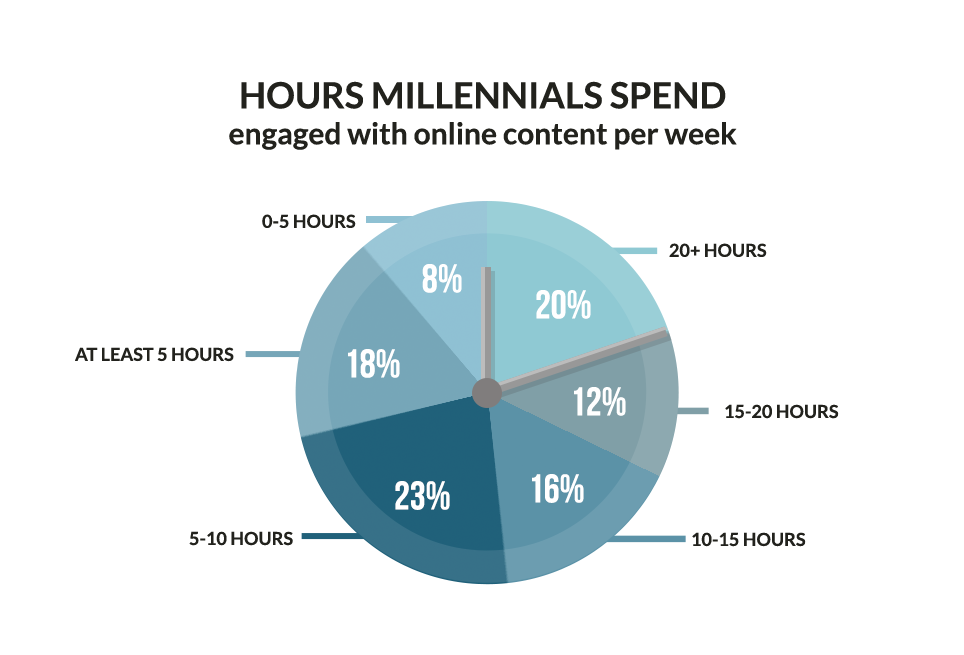
Millennials (those born between 1981 and 1996, and who are also known as ‘Generation Y’) now represent the largest generation in the United States.
Growing up alongside the birth of the Internet, ecommerce, and various digital innovations has made many view the millennial generation as the most technologically savvy.
Pew Research Center, for example, has previously referred to millennials as “digital natives in a land of digital immigrants.”
What’s more, it’s the generation deemed most likely to remain focused on ‘being connected’; using technology to do whatever they need to do in their day-to-day lives — even when on the move.
So, how do millennials behave when it comes to consuming media? With the highest social media usage among adults, millennials spend 253 minutes accessing apps or the internet via a smartphone per day.
And in the U.S, they hold a vast amount of spending power — an estimated $2.5 trillion.
How Millennials Interact with and Consume Content
Fractl and BuzzStream narrow down millennial content consumption through the hours they spend engaged with online content per week, revealing:
- 20% spend 20+ hours
- 12% spend 15-20 hours
- 16% spend 10-15 hours
- 23% spend 5-10 hours
- 18% spend at least 5 hours
- 8% spend 0-5 hours
In fact, social media has become a ‘gateway’ for accessing a diverse range of content — ranging from video, music, entertainment, and gaming to informational, brand, and government-issued content, as well as general news.
Nearly 100% of millennials say they use the internet, with 19% being smartphone-only internet users.
More than nine-in-ten millennials own smartphones, and 86% use social media. — Pew Research
Worldwide, millennials own an average of 8.4 social media accounts. — GWI
Here are some useful stats to note on millennial social media usage, courtesy of Sprout Social:
- Nearly three-quarters (72%) of millennials report that their social media usage has risen in the past year
- Millennials are likely to connect with businesses on Facebook (70%), Instagram (64%) and Twitter (33%).
- Millennials are the most likely generation to buy after seeing an ad, watching a product video, or reading a social media review.
Millennials use social media to connect with their peers and with the world around them, and that’s not slowing down; 63% have increased their usage over the past year, and 46% expect it to continue to increase over the next three years.
Across the United States, the UK, Germany, Brazil, and Japan, millennial consumers are consistently more likely to use social platforms for consuming media, with this content being particularly attractive because it’s bite-sized, snackable, and highly personalized. There’s no ‘chasing content’, and no subscription needed. — Deloitte’s Digital Trends Survey
Millennials spend an average of 2.25 hours per day on online social platforms. — Statista
99% of millennials say they would refer a business to their network if they felt connected to them on social media. — Sprout Social
They often split their time between two device screens when they consume content. In fact, 95% of millennials say they always, often, or sometimes find themselves multi-tasking and browsing the internet on a separate device. — BigVillage
Millennials are more likely to talk about a brand over social media. 42% of millennials who reach out on social do so to express love for a product or service, the most of any age group. And 60% of millennials have used social media for customer service, by sending either a private message or posting publicly on a brand’s page. — Sprout Social
Millennials are more likely to prefer social networks when researching brands online. — Digital 2023 Report (Kepios)
70% of US survey respondents from Deliotte’s Digital Trends Survey say ‘they follow an influencer’ on social media, with one-third stating that these online personalities influence their buying decisions — a figure that increases to more than half for US millennials.
Millennials are also the most likely generation to be impulse shoppers and to pay for ‘access’ rather than ‘ownership’. — GWI
Millennials trust reviews from verified customers. 90% say that they are more likely to purchase from a brand after reading verified customer reviews. — Sprout Social
There’s a higher churn rate when it comes to media subscriptions and millennials. Deloitte’s Digital Media Trends Survey found that, on average, 46% of millennials added and canceled at least one streaming subscription (a higher rate than the average of 33%). This suggests that this generation has a lower sensitivity threshold in regards to rising prices.
“In every country we surveyed, consumers — particularly Gen Zs and Millennials — are getting savvier about determining how much money they will spend on what content.” — Digital Media Trends Survey, Deloitte
Keeping track of news and current affairs and finding funny or entertaining content are millennials’ top reasons for logging in. The top social media accounts followed by male millennials are gaming bloggers, sports stars, entrepreneurs, politicians, and comedians. Among female millennials, beauty, food, and fitness bloggers are the most popular. — GWI
Millennials are still spending a lot of time on long-standing social media platforms such as Facebook and YouTube. Facebook and YouTube rule the roost. The leading social networks among millennials are Facebook and YouTube, with Instagram, Snapchat, and Twitter following as favorites. — ypulse
How much time do millennials spend on YouTube? 37% of millennials say they binge-watch on a daily basis. YouTube is the leading channel for video content consumption, preferred by 35% of millennials. — Comscore
Millennials spend significantly less time with TV news than adults 38 and older. While people aged 38 and older spend almost an hour each day watching TV news, millennials spend an average of just 12 minutes watching TV news each day — that’s because 88% rely on consuming their news digitally. — Nielsen
42% of Americans aged 12 and older listen to podcasts monthly, with millennial listening rates reaching 62%. — Edison Research
29% of millennials say they tend to buy brands they see advertised online. — GWI
Opportunities for Companies
Not all millennials are the same when it comes to content consumption. It means that organizations will always need to merge their understanding of how to communicate with different millennial population segments with their knowledge of their target audience in order to create the best personalized content experiences.
Brands succeed when they gain cultural relevance. While the rise of ‘crowd culture’ diminishes the impact of branded content and sponsorships, it has greased the wheels for an alternative approach called ‘cultural branding’, researching and identifying ideologies that are relevant to millennials and gaining traction in crowd cultures. — Harvard Business Review Millennials appreciate thought leadership and expertise. This is your company’s chance to provide killer content that ranks highly on Google and show young consumers that you’re the industry buff. — HubSpot Millennials are savvy internet users. Keep in mind that 57% of millennials block ad content because it is too pushy. “We’re doing a lot of self-education and prefer it that way. We’re used to on-demand info. We’re skeptical, critical thinkers. We’re into transparency, and we want personalized experiences.” — Alex Rynne, LinkedIn Associate Content Marketing Manager Focus on providing a personal experience that resonates with your target market. A millennial’s brand affinity lies in engagement — 62% of millennials say they are likely to remain loyal customers through consistent engagement with a brand. — Social Media Today
Building your brand goes hand in hand with building a millennial’s brand. This cohort stands out the most from the average internet user in wanting brands to improve their image and reputation. They’re a status-seeking bunch and are unlikely to be intrigued by brands that don’t make them stand out from the crowd. — GWI As they grow older, millennials want expertise. They’re looking beyond video, interactive tools, or ‘cool’ social experiences when they consume content. Personal touchpoints are key, but business content still must provide real insight and inspiration versus blatant product marketing. — Content Science Review From product discovery to job hunting, millennials use social media to get things done. They seek easy, intuitive experiences from brands, which explains why millennials cite convenience as the most important and compelling reason for social commerce. To attract millennials, streamline your customer journey and make each touchpoint painless. — Sprout Social The number of millennials working in management/senior roles has grown by 20% since 2020 — and now stands at 19%. Pre-Covid, millennials were often credited with changing employer-employee power dynamics, and they’ve climbed the career ladder since then. This has given them even more of an upper hand in today’s job market. — GWI Many millennials are now in senior leadership and decision-making roles, and 80% or more want content that provides information on a seller’s products from their peers, colleagues and the seller’s customers. They want a curated content experience that addresses their business, industry, or market conditions. — Digital Commerce 360 Their preferred format for B2B content consumption? Nearly all millennials (96%) say that video is important when deciding to move forward in the decision-making process, and that video content and communication are both useful in the post-purchase stages. A whopping 80% of millennials prefer video for learning how to use a product or service, and 81% prefer video over written formats for troubleshooting. And for 70%, video is the most helpful content format when creating awareness of business-related problems. — Brightcove Millennials have no interest in ‘playing the game’ with brands and advertisers. In this age of social media, ‘authenticity’, consistency, and continuity are all important considerations when developing content for this generation. They want to see ‘imperfect’ and they want to see brands being open. Marketing Strategist Matthew Tyson once wrote that Millennials are not moved by flashy ads, big promises, and ‘wow’ factor. They want authentic messages, authentic brands, and authentic interactions. When creating content for millennials, avoid targeting the ‘millennial’ audience with broad brush campaigns. Invest time to understand the media consumption habits of millennials, because, positioned correctly, your brand stands a far better chance of fostering strong brand loyalty from them. Remember that this generation is especially tech-savvy, connected, brand-conscious, and more likely to share brand experiences. Narrow your engagement efforts by targeting highly specific segments of the wider millennial audience, and make every attempt to interact with your users on an individual, authentic level.Conclusion







Comments
Comments are closed.
We invite you to share your perspective in a constructive way. To comment, please sign in or register. Our moderating team will review all comments and may edit them for clarity. Our team also may delete comments that are off-topic or disrespectful. All postings become the property of
Content Science Review.